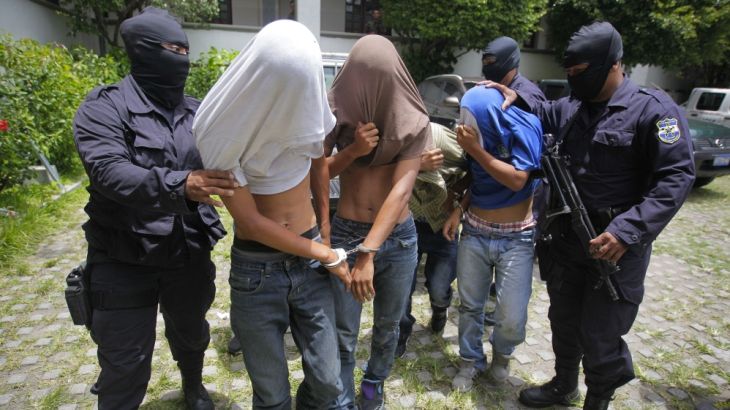A murder an hour: El Salvador’s gang violence soars
Officials unwilling to negotiate with gangs, even after country recorded highest homicide figures since civil war.

San Salvador, El Salvador – We’ve just finished reporting for a week in El Salvador.
My team and I have all spent considerable time in the country over the past five years. Killing, corruption and ingrained poverty are nothing new.
Keep reading
list of 4 itemsIn Mexico’s election, candidates grapple with the search for the missing
Kazakhstan jails former minister for 24 years over wife’s torture, murder
Key takeaways as ex-Trump lawyer Michael Cohen testifies in New York trial
But this trip particularly touched us. We visited the only detention centre for girls, interviewed a gang leader who wants to sit down with the government and visited a morgue where they sometimes receive a dead victim of violence every hour.
|
|
With 677 murders, June posted El Salvador’s highest monthly number of homicides since the civil war ended in 1992.
Our local producer Ivan Manzano who grew up during the civil war says he hasn’t seen things this violent in a long time.
We took small consolation in the fact that July is on course to have around 350 murders – roughly half that of June. But that still means someone is murdered every two hours.
Some major cities in the world considered violent have a murder or two every day. Imagine 12 murders every day in a country with a little more than six million people. The problem seems overwhelming.
While the murder rate for July is set to decline, the power of the gangs became clear when halfway through our trip they brought chaos and fear to the streets.
According to the government, the 18th Street gang was targeting bus drivers and passing out fliers telling bus lines not to run or they risked paying a high price.
At least eight drivers and transportation workers were killed in a 48-hour period. Dozens of bus lines stopped operating and the streets of the capital became clogged with pick-up trucks and vans that came out to fill the gap. Tens of thousands of people piled into these overcrowded vehicles, risking accident and injury to get to work.
Riding the morning commute with around 20 people in the back of a truck we got a sense of how difficult Salvadorans’ lives are.
A nurse on her way to work had a sad and frustrated look on her face.
RELATED: Thousands displaced by El Salvador gang violence
“The gangs have shown that they have the power because if they didn’t they couldn’t have paralysed transport,” she said.
A man holding on to a rope down the middle of the truck bed to balance himself said “It’s the hard-working honest people who built this country who are the ones who suffer from these attacks”.
I asked several in the truck if the government should hammer out a truce with the gangs like the one in 2012 that brought killings down by 40 percent.
Not a single person supported that. The nurse said “You can’t deal with terrorists – and the gangs are terrorists”.
I was surprised that people who live amid so much killing wouldn’t grab at nearly anything to reduce the murder rate. But public opinion is clearly behind the government, which refuses to negotiate with the gangs.
|
|
Moments after speaking to the commuters in the pick-up truck we had a chance to interview a high ranking government secretary.
I asked Eugenio Chicas, the communications secretary, how many killings would it take to get the government to open talks with the gangs, 700 a month, 800, 1,000?
He said, “It’s not part of our strategy. We’re not going to … negotiate, communicate or make any pact with these criminal groups. This is terrorism and sabotage against the public transport system”.
As journalists, we aim not to have too strong of an opinion about policy. We aim to be independent and subjective.
But it was hard to see how a people, who have lived with so much killing – through 12 years of war and now decades of gang violence would reject outright a strategy, that seemed to have success in making them safer.
When you push that point with Salvadorans they often say the truce only allowed the criminals to regroup, rearm and grab territory. One politician told us the number of missing went up, even though the murder rate dropped.
RELATED: Trying to end gang bloodshed in El Salvador
We spoke with a gang leader who says the government doesn’t understand the phenomenon of the gangs.
“Santiago” told us the neighbourhoods gang members come from have no services and no sense of hope.
“In these neighbourhoods, there are no basketball teams, but there are gangs. There are no hospitals, but there are gangs. There are no boy scouts, but there are gangs”.
It almost sounded like the same refrain heard from the FMLN fighters in the civil war from 1980 – 1992.
But the FMLN is now in power and at least for now they show no sign of wanting to acknowledge that more guns, more police and more patrols might not be working.